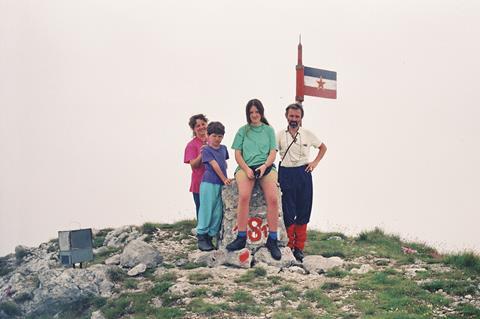Natasa Urban’s timely portrait of the Serbian national psyche takes the top prize at CPH:DOX

Dir: Natasa Urban. Norway. 2022. 110 mins.
Natasa Urban’s intricate patchwork portrait of the Serbian national psyche is a deft balance between deeply personal shared intimacies and a potent account of a drift toward nationalism and conflict which could hardly be more globally relevant. The film takes its title, and a core theme from not one but two eclipses. The first, in 1961, was vaunted as an exciting scientific phenomenon: “the eclipse is magnificent and deserves our full attention” was the line from the Yugoslav authorities. The second, the total solar eclipse of August 11, 1999, was met by fear and superstition in the Serb Republic of former Yugoslavia. The public barricaded themselves inside, blocking out the lunar shadow, brainwashed by the media into a state of apprehension and suspicion about this rare event. It is an elegant metaphor for the seismic shift in the psychology of a country struggling with the legacy of war, the fear of the ‘other’ and crimes committed in the name of nationalism.
Peace and stability, the picture argues, are precarious states which can be taken for granted until they are no longer there.
Urban is best known for her mid-length documentary work, including the multi-award-winning Journey Of A Red Fridge (co-directed with Lucian Muntean), about a 17-year-old porter in the mountains of Nepal. Her first feature-length documentary, The Eclipse won the top prize at CPH:DOX and should find a warm reception on the festival circuit, where further awards are a possibility. Rewarding, thought-provoking and timely, this could prove to be a title of considerable interest to documentary specialist distributors.
Now living in Sweden, Urban approaches the rediscovery and reckoning of the country of her birth through the minds and the memories of family and friends. It helps that many of her interviewees – particularly the two grandmothers and a colourful aunt – are natural storytellers who effortlessly bring to life their recollections of before and during the war in Yugoslavia, with vivid details and no small degree of humour. Urban prompts her Grandma Elena to tell of the time she stole the goose with the gypsies. Grandma Elena is only too happy to do so, but then segues into an anecdote about a man getting shot in the hallway of her building.
Urban also has access to her father’s “mountain log book”, a detailed account of his hikes in the wilds of the former Yugoslavia. The diaries are, on the one hand, brusquely factual: “Time spent in nature: 8.66 hours; weather: cloudy; air temperature: 8-9 degrees.” But there’s a romance to her father’s ventures out into the countryside. On one solo trip, he decides that he wants to touch the water of all four of the lakes in the region, and has to negotiate his way onto private land to do so. Urban recreates these walks, filming her father retracing his routes while in a narration, he reads from his diaries. But for all his connection with the beauty of his country, its physical drama and history, Urban’s father is rather more hazy about the details of its role in the worst atrocities of the conflict. She has to gently remind him of the extent of the Srebrenica massacre, in which over 8000 Bosnian Muslim men and boys were killed by Serbian forces. It is not an unusual reaction – one of her friends has almost entirely walled off her memories of the past, another seems broken and disengaged from reality.
And this is why this lyrical, strikingly beautiful essay film feels so very essential. Peace and stability, the picture argues, are precarious states which can be taken for granted until they are no longer there. Addressing history – all of it, including the inconceivably ugly episodes – is essential, if there is to be any hope of avoiding repeating it.
Production company: Medieoperatørene as
International sales: Taskovski Films Ltd, sales@taskovskifilms.com
Producer: Ingvil Giske
Cinematography: Ivan Markovic
Editing: Jelena Maksimovic
Music: Jared Blum, Bill Gould















![[L-R]: Amanda Villavieja, Laia Casanovas, Yasmina Praderas](https://d1nslcd7m2225b.cloudfront.net/Pictures/274x183/6/4/1/1471641_pxl_20251224_103354743_618426_crop.jpg)








